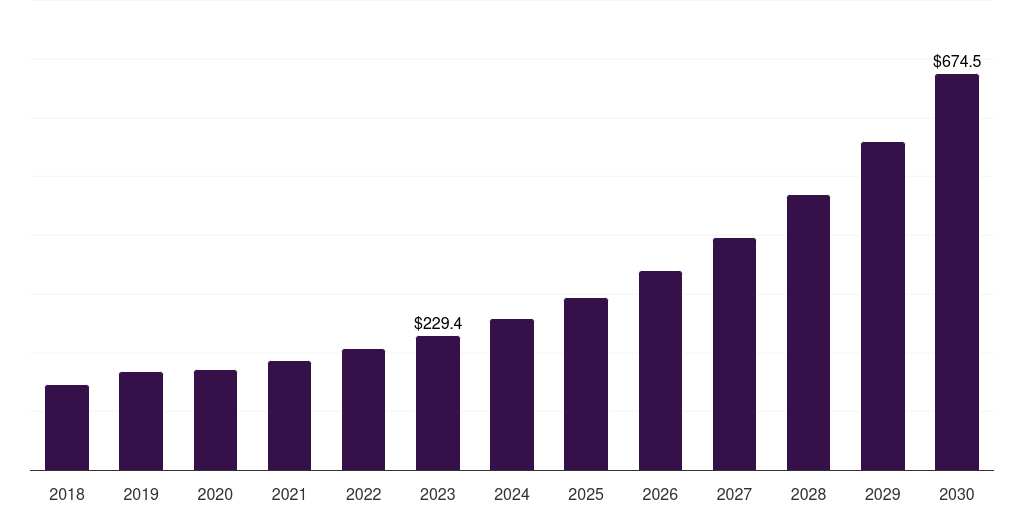Brazil Intelligent Traffic Management System Market Size & Outlook
Brazil intelligent traffic management system market, 2018-2030 (US$M)

Related Markets
Brazil intelligent traffic management system market highlights
- The Brazil intelligent traffic management system market generated a revenue of USD 258.2 million in 2024 and is expected to reach USD 674.6 million by 2030.
- The Brazil market is expected to grow at a CAGR of 18.1% from 2025 to 2030.
- In terms of segment, traffic monitoring system was the largest revenue generating solution in 2024.
- Intelligent Driver Information System is the most lucrative solution segment registering the fastest growth during the forecast period.
Intelligent traffic management system market data book summary
| Market revenue in 2024 | USD 258.2 million |
| Market revenue in 2030 | USD 674.6 million |
| Growth rate | 18.1% (CAGR from 2025 to 2030) |
| Largest segment | Traffic monitoring system |
| Fastest growing segment | Intelligent Driver Information System |
| Historical data | 2018 - 2023 |
| Base year | 2024 |
| Forecast period | 2025 - 2030 |
| Quantitative units | Revenue in USD million |
| Market segmentation | Traffic Monitoring System, Traffic Signal Control System, Traffic Enforcement Camera, Integrated Corridor Management, Intelligent Driver Information System, Other |
| Key market players worldwide | Thales, International Business Machines Corp, Portland General Electric Co, Siemens AG, TomTom NV, Q-Free ASA Ordinary Shares, Transcore, Cubic Corporation, Atkins, Kapsch Group |
Other key industry trends
- In terms of revenue, Brazil accounted for 2.1% of the global intelligent traffic management system market in 2024.
- Country-wise, U.S. is expected to lead the global market in terms of revenue in 2030.
- In Latin America, Brazil intelligent traffic management system market is projected to lead the regional market in terms of revenue in 2030.
- Brazil is the fastest growing regional market in Latin America and is projected to reach USD 674.6 million by 2030.
No credit card required*
Horizon in a snapshot
- 30K+ Global Market Reports
- 120K+ Country Reports
- 1.2M+ Market Statistics
- 200K+ Company Profiles
- Industry insights and more
Intelligent Traffic Management System Market Scope
Intelligent Traffic Management System Market Companies
| Name | Profile | # Employees | HQ | Website |
|---|
Brazil intelligent traffic management system market outlook
The databook is designed to serve as a comprehensive guide to navigating this sector. The databook focuses on market statistics denoted in the form of revenue and y-o-y growth and CAGR across the globe and regions. A detailed competitive and opportunity analyses related to intelligent traffic management system market will help companies and investors design strategic landscapes.
Traffic monitoring system was the largest segment with a revenue share of 23.86% in 2024. Horizon Databook has segmented the Brazil intelligent traffic management system market based on traffic monitoring system, traffic signal control system, traffic enforcement camera, integrated corridor management, intelligent driver information system, other covering the revenue growth of each sub-segment from 2018 to 2030.
Transportation and infrastructure play a vital role in the Brazilian economy. The country is home to a booming automobile industry and the second-highest number of airports in the region.
The Brazilian government has been pursuing various public-private partnerships to strengthen the country’s transportation system and build a modern infrastructure addressing the growing challenges associated with traffic congestion, growing vehicular emissions, rising number of road accidents, and aging public transportation infrastructure.
For instance, in March 2022, the Sao Paulo State Metropolitan Department increased the capital expenditure allocated to build and operate passenger rail projects in a public-private partnership from USD 1.50 billion to USD 1.80 billion. Such initiatives are expected to boost the growth of the Brazilian intelligent traffic management system market.
Reasons to subscribe to Brazil intelligent traffic management system market databook:
-
Access to comprehensive data: Horizon Databook provides over 1 million market statistics and 20,000+ reports, offering extensive coverage across various industries and regions.
-
Informed decision making: Subscribers gain insights into market trends, customer preferences, and competitor strategies, empowering informed business decisions.
-
Cost-Effective solution: It's recognized as the world's most cost-effective market research database, offering high ROI through its vast repository of data and reports.
-
Customizable reports: Tailored reports and analytics allow companies to drill down into specific markets, demographics, or product segments, adapting to unique business needs.
-
Strategic advantage: By staying updated with the latest market intelligence, companies can stay ahead of competitors, anticipate industry shifts, and capitalize on emerging opportunities.
Target buyers of Brazil intelligent traffic management system market databook
-
Our clientele includes a mix of intelligent traffic management system market companies, investment firms, advisory firms & academic institutions.
-
30% of our revenue is generated working with investment firms and helping them identify viable opportunity areas.
-
Approximately 65% of our revenue is generated working with competitive intelligence & market intelligence teams of market participants (manufacturers, service providers, etc.).
-
The rest of the revenue is generated working with academic and research not-for-profit institutes. We do our bit of pro-bono by working with these institutions at subsidized rates.
Horizon Databook provides a detailed overview of country-level data and insights on the Brazil intelligent traffic management system market , including forecasts for subscribers. This country databook contains high-level insights into Brazil intelligent traffic management system market from 2018 to 2030, including revenue numbers, major trends, and company profiles.
Partial client list
Brazil intelligent traffic management system market size, by solution, 2018-2030 (US$M)
Brazil Intelligent Traffic Management System Market Outlook Share, 2024 & 2030 (US$M)
Related industry reports
Related regional statistics
Sign up - it's easy, and free!
Sign up and get instant basic access to databook, upgrade
when ready, or enjoy our
free plan indefinitely.
Included in Horizon account
- 30K+ Global Market Reports
- 120K+ Country Reports
- 1.2M+ Market Statistics
- 200K+ Company Profiles
- Industry insights and more



